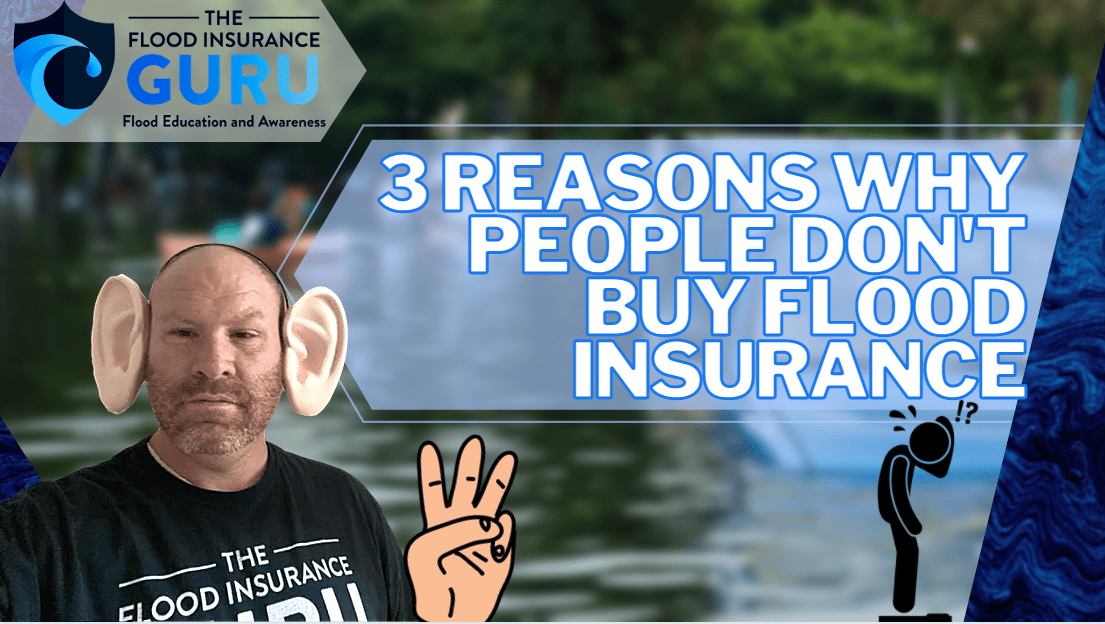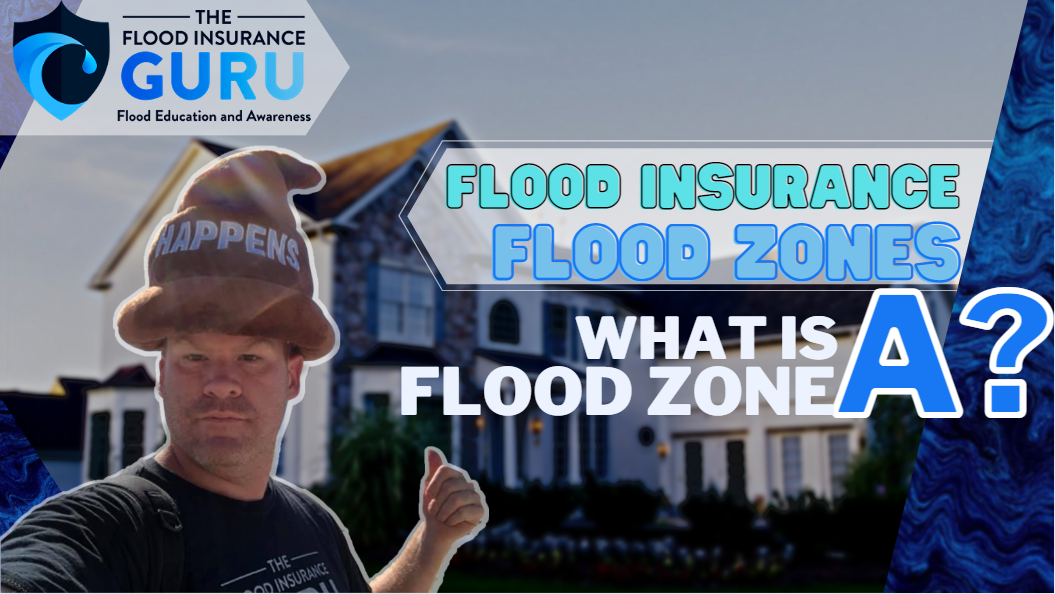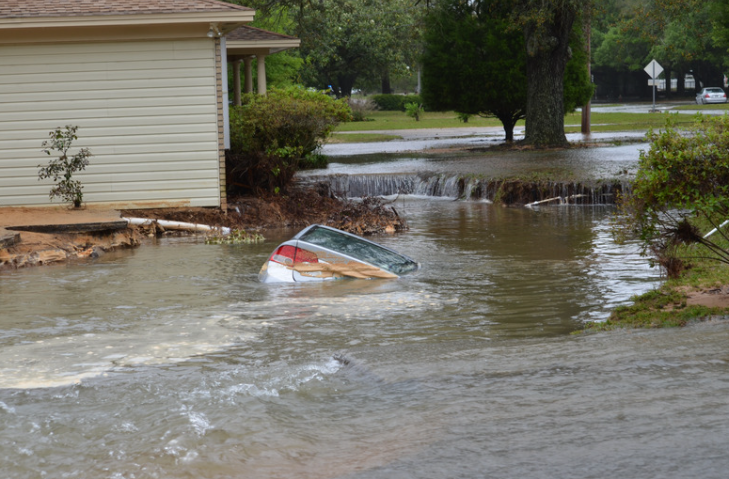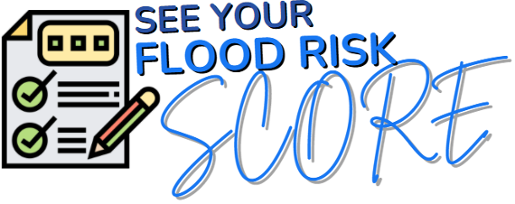
When it comes to insurance policies, these things involve a lot of commitment and hard-earned cash from everyone, so people are starting to become more careful with it.

Today, we want to talk about the three reasons why people across the United States don't buy flood insurance and understand why you should avoid this type of thinking.
Not in a Flood Zone
The first reason we always hear that comes from not just property owners, but also mortgage lenders and insurance agents. This is a common misconception in the flood insurance industry which we've covered in our previous blog.
When a mortgage company tells you that you're not in a flood zone, this doesn't really mean that you won't get flooded instead it simply means that your property is no longer in a high-risk flood area or high-risk flood zone like a flood zone A.

A lot of people think that they're not in a flood zone, so they don't need flood insurance however this isn't really the case. When your mortgage company or insurance agent tells you that you're not in a flood zone hence you don't need flood insurance, this doesn't mean that you're not going to be flooded.
It's important to note that when you're not required to carry flood insurance is due to the fact that maybe your house sits on or was moved into a low-risk area. Now, when it comes to the time that a flood event happens, these low-risk flood zones have less likelihood to get properties inundated with water.
We've seen this happen with New York where a lot of people couldn't find coverage for the flood damage that was brought by Hurricane Ida. The thinking that only high-risk areas need to have flood insurance is a big hoax in the industry since there's individual flood risk for each property.
This is why a flood map or flood insurance rate map would show you in a flood zone regardless. This requirements of when to get flood insurance based purely on flood zones are creating a bigger disaster than the water itself.
This isn't an exception from the damages, however. This brings us to the second reason.
Flood Risks
A lot of low-risk areas get inundated with water even after a storm or heavy rainfalls in other zones because there's a chance that the excess flood water will flow into these low-lying communities. You also have to consider that certain development disrupts the natural pathways of water and causes only 10% of the water to go into the ground.
This second reason will be coming from people who know that they're in a low-risk flood zone, but underestimates the damages that flooding can bring to their doors. It's important to note that these flood zones determine how much flood that your property might get. This doesn't indicate how severe the impact may be as flood damage varies depending on the circumstances.

A rapid flash flood can cause more damages than standing water that's inundated your home. This also means that it's very much possible to have the same flood impact regardless if you're in low-risk or high-risk areas.
According to Wharton School as cited by Zurich, in New York, eighty percent (80%) of residential property didn't have flood insurance and ninety percent (90%) of business or commercial property also didn't have any sort of protection from the flooding during Hurricane Sandy. This shows how much property and business owners disregard the opportunity to get protected through a flood insurance policy.
Homeowner's Insurance Policy
Lastly, we have another common misconception when it comes to insurance, flood coverage, and more. When it comes to this part, it's important to understand that your homeowner's policy doesn't really cover any damages from flooding. A lot of people think that flood coverage can be attached to your homeowner's insurance once you secure a policy for the structures in your home.
Flood insurance is a separate entity when it comes to insurance coverage. Yes, this will still get you coverages for the damages on the insured building that's been inundated with water. So let's take a few steps back and understand what's covered by your homeowner's insurance and your flood policy.
Now, when it comes to damages any type of water damage that impacts your home will be covered in the policy jacket of your homeowner's policy. This is because when it comes to floods, there's what we call the "Number Two Rule" set by the federal government through the Federal Emergency Management Agency (FEMA) and the National Flood Insurance Program (NFIP).
This rule determines if you need to file a claim to your homeowner's insurance company or through flood insurance, be it FEMA or the private flood insurance market. According to the rule, it will only be considered as flood damage and will be covered by your flood policy if it qualifies for either one of the two conditions. A flood will only be considered as a flood if:
-
At least two (2) acres have been inundated with water - This means that if standing water starts to impact a community, it will only be considered as a flood if there are at least two acres of land are impacted and, basically, is underwater due to excess water from rain, storm, runoff, melting ice/snow, or any type of natural disaster.
-
At least two (2) properties have been inundated with water - This means that any type of two properties; house, business, or park, for example, have to be inundated or impacted by floodwater that comes due to the aforementioned reasons. In order to qualify for a flood insurance claim, one of these two properties must be your insurance building.
This can be a very frustrating experience if you don't know when you can file a flood claim for the damages. There's also a chance that you were flooded and reach out to your homeowner's insurance provider only to be rejected and left with nothing.
At the end of the day, it's always best to find security through a flood policy. This is the only way back up when all that water starts to destroy your home, the buildings you have and all their contents, and important personal property.
If you have any questions about flood risks, how to get flood insurance through FEMA, NFIP, or the private market, or anything about floods, reach out to us by clicking below.
Remember, we have an educational background in flood mitigation which lets us help you understand flood risks, your flood insurance, and mitigating your property long-term.
-rgb-300px-w-300ppi.png?width=350&height=124&name=tfig-logo-inverted-(for-dark-backgrounds)-rgb-300px-w-300ppi.png)
-rgb-300px-w-300ppi.png?width=301&height=107&name=tfig-logo-inverted-(for-dark-backgrounds)-rgb-300px-w-300ppi.png)

